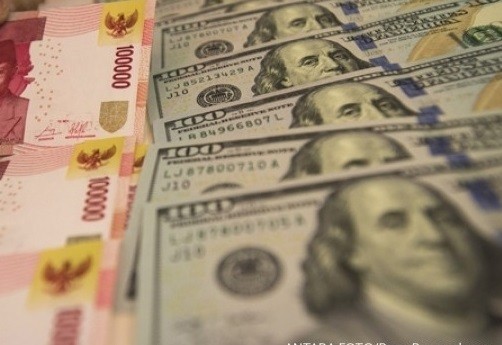Popular Reads
Top Results
Can't find what you're looking for?
View all search resultsPopular Reads
Top Results
Can't find what you're looking for?
View all search resultsRupiah falls to 16-month low as investors dump risky assets
The rout on markets around the world has hit Indonesian shores, with the rupiah falling to 14,820 against the US dollar around noon today.
Change text size
Gift Premium Articles
to Anyone
T
he rupiah has fallen to a level unseen since November 2018 as fears over COVID-19 have prompted investors to dump risky assets amid the rout on global markets.
Bloomberg reported that the rupiah depreciated 2.05 percent to 14,820 against the US dollar at 12:06 p.m. on Friday in Jakarta, while Bank Indonesia (BI) recorded that the currency weakened to Rp 14,815 against the greenback on the Jakarta Interbank Spot Dollar Rate (JISDOR).
The rupiah has fallen about 4 percent this week, the worst in the region as Malaysian ringgit fell almost 3 percent.
The yield on 10-year government bonds grew 17 percentage points on Friday from the previous day's figure, indicating a drop in price. Meanwhile, foreign investors dumped Rp 1.36 trillion (US$92.35 million) in Indonesian shares during morning trading on Friday as the Jakarta Composite Index (JCI) slumped 5.02 percent after hitting circuit breaker in early trading.
Read also: Trading halted for first time since 2008 over pandemic
The selloff in Indonesian equities follows the rout on global markets during Friday trading, with Tokyo dropping 2.25 percent, Hong Kong 0.67 percent and Singapore 0.72 percent.
On Thursday, London recorded its worst day since the 1987 crash, free-falling 10.9 percent, while Frankfurt saw its darkest day since 1989 – the year the Berlin Wall fell by falling 12.2 percent, and Paris suffered its worst one-day loss ever as it lost 12.3 percent. Meanwhile, the Dow Jones saw its worst session since 1987, falling 9.99 percent.
“People have come to a realization that they were on the wrong side of the market,” said Rainer Michael Preiss, equity chief investment officer at the Global CIO Office in Singapore as quoted by Bloomberg on Friday.
“People should have listened to the medical experts rather than the economists and realized that they were holding the wrong assumptions about earnings,” he said.
The World Health Organization (WHO) on Thursday declared COVID-19 a "pandemic" as confirmed cases increased to more than 130,000 worldwide and the death toll to more than 4,900.
Indonesia has reported 34 confirmed cases to date.
Read also: Government allocates $8b to stimulate economy as businesses, workers suffer from COVID-19 impacts
“There’s a possibility that the rupiah [exchange rate] could reach Rp 16,000 per dollar,” said president director Ibrahim of futures firm PT Garuda Berjangka.
Earlier this week, BI revealed foreign outflows of around Rp 31.76 trillion in government bonds and Rp 4.87 trillion in Indonesian shares since January as investors fled to safe haven assets. The central bank has bought Rp 130 trillion in government debt papers since January, of which around Rp 110 trillion has been spent since COVID-19 spread outside China in late January.
“We are committed to remaining in the market to stabilize the rupiah by selling dollars as cash or domestic non-deliverable forwards,” BI Governor Perry Warjiyo said on Wednesday.










